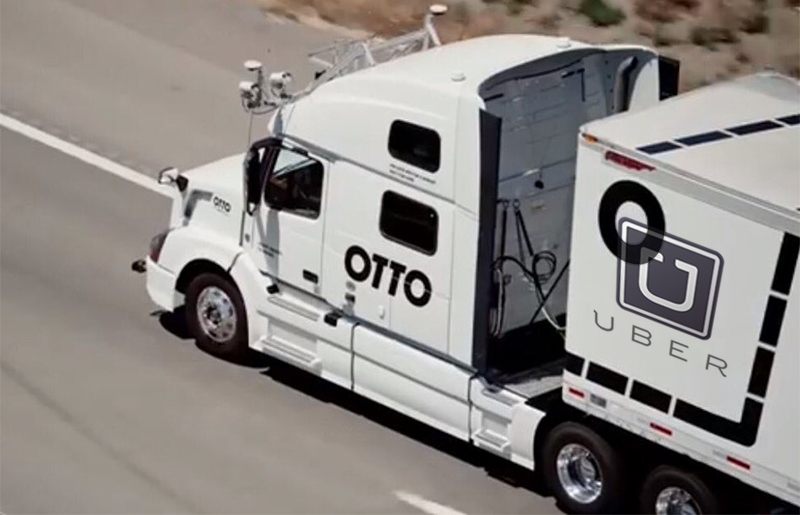With the ostensible proliferation of new players on the trucking scene that say they are essentially an Uber for trucking, it turns out that this description may in fact be a misnomer, according to a recent report issued by supply chain consultancy Armstrong & Associates.
In its report, which is comprised of feedback from 27 companies providing Uber for Trucking services, Armstrong explained that “Digital Freight Matching” (DFM) reflects these types of services far more accurately.
Armstrong said that the reason for this, outlined in the report entitled “Digital Freight Matching-Capturing Technology-Based Efficiencies in the Trucking Industry” is that “DFM companies use digital platforms to match a Shipper’s freight with available Carrier capacity. The goal is to better utilize motor carrier capacity by offering a convenient digital app to connect shippers and carriers.”
What’s more, Armstrong makes a strong case for this thesis with strong supporting data in that: global investment in on-demand digital technologies hit a record $18 billion in 2015; the DFM sector saw more than $180 million in venture capital funding going back to 2011 (with $67 million of that coming in 2016); and estimates of empty miles between 10-23 percent as e-commerce fulfillment costs continue to head up.
Given these data points, Armstrong explained that it could translate into an Uber-type offering as a way to augment things akin to what Uber does for underutilized taxi capacity for passengers in that an Uber app for trucking typically matches supply with demand.
“But one of the key components of Uber’s model is the commodity-like nature of the ride-hailing service,” Armstrong said.
“[This report] shows the principle behind Digital Freight Matching may be simple, but the trucking industry is not. Domestic transportation is not a simple commodity. Complexities arise in the form of specialized equipment types, shipments transported via multiple modes, and necessary exception handling for service issues such as equipment breakdowns. Shipments are high-value and time sensitive. Placing an Uber-like app atop a complex industry doesn’t truly address the problem. Shippers and Carriers alike will be disappointed if this is the extent of the ‘solution.’”
And based on feedback from its participating companies in the report, Armstrong explained that the majority of DFM providers do not imitate Uber and they also don’t consider themselves as Uber for Trucking players either, instead they consider themselves far more trucking-specific for things that are leveraged by Uber but with a trucking emphasis, including: algorithmic pricing, API map integration, track-and-trace, and mobile transactions - along with features specific to trucking, such as trip planning, digital document storage, and TMS integration.
Freight transportation and logistics experts, John Larkin, managing director, research, at Stifel; Thom Albrecht, managing director, transportation equity research, at BB&T Capital Markets; and Evan Armstrong, president of advisory firm Armstrong & Associates Inc., weighed in on the so-called Uberization, or as the Armstrong report notes, DFM, of trucking, in Logistics Management’s Truckload Brokerage Roundtable last month.
Armstrong & Associates President Evan Armstrong observed that most of these companies have functionality beyond the Uber car matching service app and many have components to help users find competent carriers, help truckers with time management, or to find a clean truckstop.
“The real question surrounds the empty miles currently being run, and what percent could be efficiently filled by an Uber-style app without disrupting trucking companies’ operations or causing a driver to run out of hours?” he said.
“Also, in headhaul directions, which apps could provide trucking companies with more profitable loads? In practicality, we think these cases are limited. However, even with as little as 5% of the trucking spend going to Uber-style matching apps, the market could garner approximately $35 billion in freight under management.”
And Stifel analyst John Larkin noted that Uberization is something that will ultimately evolve, but it will not burst on the scene as the result of a venture capital financed Silicon Valley-based start up introducing an app.
“Shippers, in our view, are simply not going to turn over a $250,000 load to a company that has technology, but little knowledge or experience in the highly nuanced world of freight transportation,” he noted. “Instead, the larger, better capitalized brokers will incrementally move us in the direction of more automated brokerage by rolling out automated modules that will gradually make brokerage less people intensive. Shippers will undoubtedly experience less heartburn with this approach.”
Finally, from a provider perspective, Abtin Hamidi, chief vice president and co-founder of Mountain View, Calif.-based CargoChief a provider of transportation and logistics technology focused on providing shippers with securing over-the-road capacity and pricing, among other services, pointed to a tremendous response in the market for Uber-like trucking services.
“The response has been tremendous, with an initial focus on small and medium shipper and all types of companies like Fortune 500 companies being frustrated by their current solution and recognize need for a change and are sniffing around for that,” Hamidi recently told Logistics Management.
“That has been a good trend with the other trend being the deconsolidation of procurement from some of the Fortune 500 companies. It has really tied nicely into our hypothesis that the spot market is going to eventually win, and we can service folks in the spot market with the same level of service as a contractual carrier and that is what we are seeing. We center our business around making things easier for carriers and that has created an opportunity for us to learn more and get more data, and things are evolving to next phase of smart capacity.”
Related Article Uber Freight: Another “Uber-for-Trucking”?
About the Author
Follow Robotics 24/7 on Linkedin
Article topics
Email Sign Up




















